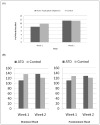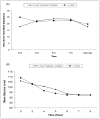Evaluating the role of serotonin on neuropsychological function after breast cancer using acute tryptophan depletion
- PMID: 21196424
- PMCID: PMC3673716
- DOI: 10.1177/1099800410393273
Evaluating the role of serotonin on neuropsychological function after breast cancer using acute tryptophan depletion
Abstract
Although cognitive dysfunction is a prevalent and disruptive problem for many breast cancer survivors (BCSs), little research has examined its etiology. One potential mechanism that remains to be explored is serotonin. Serotonin has been implicated in normal and dysfunctional cognitive processes, and serotonin levels are significantly affected by estrogen withdrawal, a common side effect of breast cancer treatment. However, no study has evaluated serotonin's role on cognitive dysfunction in BCSs. The purpose of this study was to examine the role of serotonin in cognitive dysfunction in survivors by lowering central serotonin concentrations via acute tryptophan depletion (ATD). Based on previous research in noncancer populations, we hypothesized that alterations in central serotonin levels would induce cognitive dysfunction in these women controlling for confounding characteristics such as fluctuating mood and glucose levels. Secondarily, we explored whether genetic variations in serotonin genes would partly explain ATD. Participants included 20 female BCSs, posttreatment for nonmetastatic breast cancer, who received ATD or control in a double-blind, crossover design. Cognitive performance was measured at the 5-hr tryptophan/serotonin nadir on each test day using standardized neuropsychological tests. Specific impairment was noted in episodic memory (delayed recall) and motor speed during ATD versus control. ATD did not alter new learning (immediate recall), working memory, verbal fluency, or information processing speed. Findings suggest that serotonin may play a critical role in memory consolidation and motor functioning in BCSs.
Conflict of interest statement
The author(s) declared no conflicts of interest with respect to the authorship and/or publication of this article.
Figures




References
-
- Ahles TA, Saykin AJ, Furstenberg CT, Cole B, Mott LA, Skalla K, Silberfarb PM. Neuropsychologic impact of standard-dose systemic chemotherapy in survivors of breast cancer and lymphoma. Journal of Clinical Oncology. 2002;20:485–493. - PubMed
-
- Altekruse SF, Kosary CL, Krapcho M, Neyman N, Aminou R, Waldron W, Edwards BK, editors. SEER cancer statistics review, 1975–2007. Bethesda, MD: National Cancer Institute; 2010. Retrieved from http://seer.cancer.gov/csr/1975_2007/
-
- Benton AL, Hamsher KD. Multilingual aphasia examination. Iowa City, IA: AJA Associates; 1989.
-
- Blum I, Vered Y, Lifshitz A, Harel D, Blum M, Nordenberg Y, Graff E. The effect of estrogen replacement therapy on plasma serotonin and catecholamines of postmenopausal women. Israel Journal of Medical Sciences. 1996;32:1158–1162. - PubMed
-
- Booij L, Van der Does AJ, Riedel WJ. Monoamine depletion in psychiatric and healthy populations: Review. Molecular Psychiatry. 2003;8:951–973. - PubMed
Publication types
MeSH terms
Substances
Grants and funding
LinkOut - more resources
Full Text Sources
Medical
Molecular Biology Databases
Research Materials

